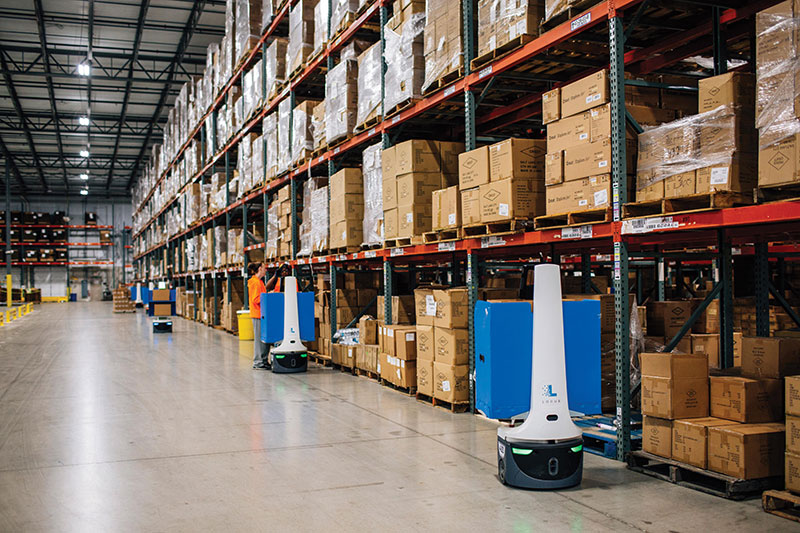By Lorie Hailey

(Editor’s note: This is part five in our series about how Kentucky businesses are responding to the challenges presented by COVID-19. See the full report.)
 Like many of his employees, Paul Verst has been working 16-hour days the past several weeks, dealing with a range of COVID-19 effects on his family-owned logistics and warehousing company, Verst Logistics, headquartered in Northern Kentucky. Verst is chairman and CEO of the company, which has 1,900 employees in five states.
Like many of his employees, Paul Verst has been working 16-hour days the past several weeks, dealing with a range of COVID-19 effects on his family-owned logistics and warehousing company, Verst Logistics, headquartered in Northern Kentucky. Verst is chairman and CEO of the company, which has 1,900 employees in five states.
When Paul Verst isn’t working, he’s thinking about work. He wonders about the long-term effects of the global pandemic and how the future of logistics will look.
“(I think about) … how can we continue to allow some to work remotely, how can we help retool supply chains, and how I can’t wait to hold my first grandchild who is due April 20 and I will not be able to hold or see he or she for awhile until this is over,” Verst said.
He isn’t alone. Logistics companies across the globe have been turned upside down. In some cases, both supply and demand are low. In others, demand is high and supply is low.
Logistics is a major part of Kentucky’s economy. Kentucky is home to large clusters of logistics and distribution operations, including Amazon, UPS Worldport, DHL Express, FedEx, Groupon, eBay, Schwan’s and many others.
Logistics and transportation companies are critical to the nation’s business infrastructure, therefore not subject to closure orders. But they still have to find ways to continue work while keeping their employees safe.
Verst shared details of the global pandemic’s impact on Verst Logistics for our “Making It Work” series.
The Lane Report: How has COVID-19 affected your business?

Paul Verst: Since we have been designated as an essential business, our doors must remain open and we must continue to provide service to our customers and the public. Much of our business is consumer packaged goods and automotive. We provide logistics support for the largest grocery chain in the U.S., filling grocery orders 24/7 to keep the grocery store shelves supplied with essential products, so that portion of our business has exploded. Our automotive manufacturer customers have closed production plants on a short-term basis, so that business has been negatively impacted. Conversely, many of the automotive suppliers continued bringing containers in from overseas and they now have no place to warehouse their inventory, so several are using us for temporary logistics support and storage.
TLR: Have any of your services changed?
Verst: Our services really have not changed much, but our core businesses of warehousing, transportation, contract packaging and eCom fulfillment have all seen increased growth. In particular, since many people are either sheltered in place or unfortunately laid off, they are ordering more things online through Amazon and other outlets instead of shopping at stores, so our fulfillment business has seen business more than double. Also, we have several customers who are now getting into the hand sanitizer and other critical COVID-19 businesses, so our contract packaging business has seen a nice uptick as well.
TLR: How have processes been altered at Verst to help limit the spread of COVID-19 but still serve the community?
Verst: Our employees continue to come to work every day with great pride, knowing they are making a difference in assuring their communities get the goods and services they need to take care of their families. Our No. 1 goal has always been to create a safe and healthy workplace for our employees. On top on the normal daily things we do, when COVID-19 hit, we added additional safety things such as hand sanitizer and wipes stations, posters explaining good hygiene habits, practicing social distancing, providing extra cleaning of the facilities, discontinuing huddles and conducting meetings spread out using a PA system, along with many other proactive measures.
TLR: When this situation arose, how did your company come up with a response plan and how quickly did you implement it?
Verst: We have always had BCPs (business continuity plans) in place for each of our facilities for natural or unplanned disasters. When COVID-19 hit, our teams assembled via conference calls and added language pertinent to COVID-19. These were updated within one to two weeks of COVID-19 hitting Washington State.
TLR: Did you conduct any special trainings or have to purchase any new equipment, etc., to respond appropriately? Are you making more use of your robotic equipment than in the past?
Verst: There was no specific new equipment we purchased, other than hand sanitizer stations. We start out every day with safety training and have a daily noon call on COVID-19 with staff where we share the latest news we have heard and things they need to share with employees. The only additional thing we needed to do with robotics was to give them extra sanitizing throughout the day.
TLR: What has been the biggest challenge?
Verst: Our biggest challenge so far was having to be very mobile, agile and fluid in what we do and how we do it, as things evolve on a daily basis depending on what the government, states or local municipalities dictate. I am spending more than half of my day dealing with COVID-19 between listening in on webinars, talking to customers on what they are doing and how it is impacting them, being asked to join ad hoc committees and commissions on COVID-19 and how we restart the economy, and maintaining social distancing. We are a family business and do so much interacting with our team members. With some working remotely or work on A/B plans, I miss seeing our people each and every day. To compensate for this, I send one to two weekly email letters to customers, and try to communicate the same way to our employees as much as possible.
TLR: Are all Verst employees still working?
Verst: Since the majority of our team members drive trucks, forklifts or work on production lines, we only have maybe 10% of our workforce who are able to work remotely. Those who are able, we allow them to do so and provide them with the technological tools they need to continue doing their jobs and serving our customers.
TLR: Is there anything else you’d like to say?
Verst: I can’t wait to win the battle over COVID-19 so we can all get our lives back.
Share your story
We want to hear how business leaders across the state have responded to the challenges presented by COVID-19 and the efforts to stop the spread of it. If your business would like to share its story, email Lorie at [email protected].



















Add Comment